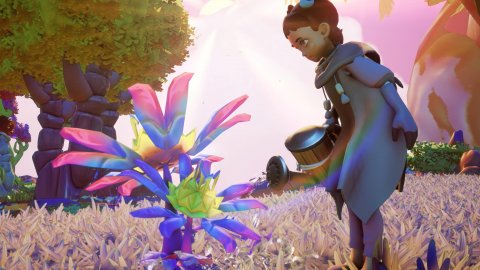Grow: Song of the Evertree, we tested the beta of this curious sandbox

Grow
505 Games is a decidedly prolific and varied publisher: the Italian house has managed to establish itself over time as a reference point for even excellent titles, catchphrases, more sought-after products. We tried the Grow: Song of the Evertree beta and first impressions are lukewarm. It is a game that tries to blend sandbox mechanics, elements of construction and exploration, a narrative background and an artistic style that we can define as dreamy, with a result that in our view tries to place itself on a fairly teen audience.This is not a bad thing, quite the opposite: the title Prideful Sloth chooses to give its game a colorful, easy-going, almost chubby, childish, very round and abstract artistic style and to combine it with mechanics typical of sandbox games such as cultivation, cleaning, harvesting, building. It must be said that the first two hours serve as a tutorial, it takes a while to get into the mood.
The last alchemists
The world of Alaria is sunny and colorful Alaria is the name of the game world, a rarefied multiverse once happy and now victim of the advance of withering. Unfortunately this evil has conquered everything, even Evertree, the tree of creation and the place where so many worlds were hosted. Everyone has fled except us, the protagonists entrusted to a fairly simple editor and, for now, not too well equipped, the last alchemists able to do something to fight against this evil progression. We will be helped by a Disney-style book, by a pot where we can try to make some alchemical formula and by a sort of griffin, capable of taking us almost anywhere on the tree. The product immediately shows the tools available to practice sandbox mechanics: watering can, hammer, sickle, hatchet and so on, all tools that will be used to overcome the first tutorials.Now, slowly we enter the gameplay in what is a small, almost floating island, hooked to one of the branches of the immense tree: the actions that we will have to carry out cyclically, in reality, do not have much bite, they flow away smoothly through a simple succession of keys pressed. Three shots to break the rock, one shot for the grass, water, catch the insect with the net, all with a fairly skating system of movement and without inertia. We are done, it's time to go back to the base and then, the next day, go back there to increase day by day the number of actions to be done, plants to water, elements to destroy in what is a progression to improve that remote island .
The flow of the game, in the first hour, is quite inconsistent, but the idea that we have made is that the approach is oriented either to those who really appreciate that type of approach to gameplay, or to a specific age range. teenager. The third day we will have to practice with other commands, other tools, all for now at a rather immediate reading level, without particular depth. Singing, the skill of our protagonist useful for making plants grow and bringing a little light into the world, is also part of the keystroke to press and daily actions to do.
Game world
Great focus has been put on the building and customization part of worlds and villages Alaria certainly has an imaginative, very dreamy, colorful trait and we are convinced the engine that makes everything run is Unreal Engine 4, given the similarities stylistic with better known titles. This allows the setting to be quite rich in spirit and detail, even if for now they are all purely aesthetic, straddling sections where exploration is limited and platforming practically does not exist.Now, apart from having to carry out the activity, the real fulcrum of the game world of Grow is the most typical construction moment, the one in which to create buildings, meet the inhabitants, deepen the system of alchemy, of objects, of customizations.
The most typically building part certainly looks more interesting than the rest, capable of opening the range and the aesthetic offer of Alaria beyond the pre-built canons. On balance, the goal will be to enrich the world tree more and more, managing a routine of actions that on paper is varied, but which in practice for now has been presented as a simple change of tool and press a button. You will have the opportunity to generate new places with different characteristics - deserts, frozen worlds - forests - inserting in the middle exploration of caves, puzzles, hopefully also fauna management, it remains only to understand their bite in the medium and long term, as well as the ability to a fairly simple, immediate and relaxed play structure to generate continuous interest in the player.
A separate mention is made of the soundtrack led by Kevin Penkin, composer of recent hits from the Anime world and the Star Wars: Visions series.
Grow: Song of the Evertree for now promises to be a title certainly rich in content, capable of offering a rather dreamy, abstract and very childish point of view to the theme of sandbox gameplay. For now, some questions remain about a playful flow that seems very didactic to us, as well as about a game world that is beautiful to see but rather empty. The whole system of construction, advancement, management of the inhabitants as well as the dynamics that are triggered and fit together with multiple active worlds should be explored.